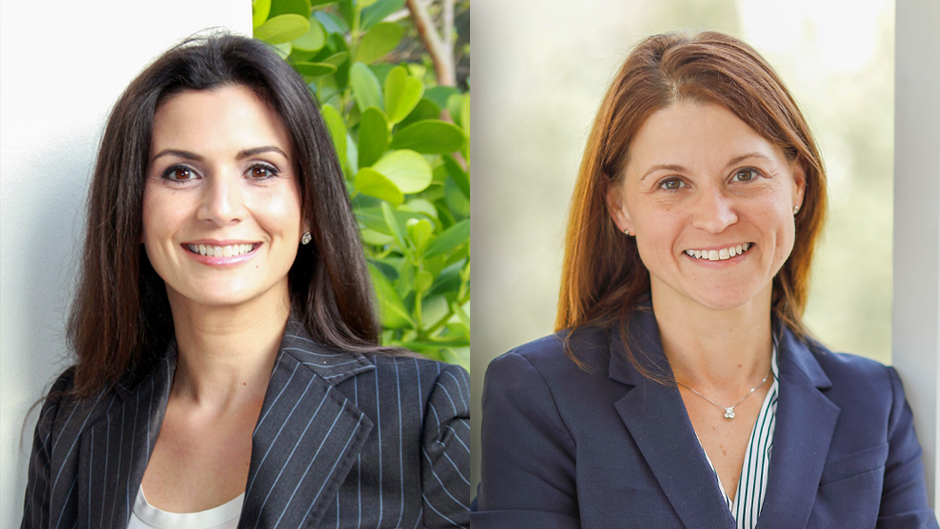Two women who have excelled to great heights in their areas of expertise, and who have demonstrated exceptional stewardship in higher education, will assume prominent leadership roles at the University of Miami this spring.
Patricia Sanchez Abril, professor and chair of the Department of Business Law at the Miami Herbert Business School, who has also served as interim dean of the Graduate School, will become interim dean of the School of Law, effective on April 1. Abril will take over for Dean David Yellen, who decided to step down recently.
“Interim Dean Abril will build on the significant accomplishments and lessons of Miami Law’s past, offering stability, focus, and continuous improvement as we identify its future leader,” University President Julio Frenk noted in a message to students, faculty, and staff members on Friday.
Nicole Leeper Piquero, a prolific criminologist and professor, currently serving as chair of the Department of Sociology and Criminology in the College of Arts and Sciences, will take over as interim dean at the Graduate School.
“We are fortunate to have in Interim Dean Piquero an experienced higher education administrator,” Frenk added, also mentioning that her more than 100 research articles on corporate crime, criminological theory, and criminal justice policy have been cited over 8,300 times.
Abril, a Miami native who studied for the Florida Bar Exam in the law library, said she is honored by the opportunity to guide the School of Law forward.
“Miami Law is a treasure in this community,” she said. “I’ve long admired the faculty and the staff at the law school, who have launched so many important legal careers. There’s a tremendous opportunity to capture the momentum, while also honoring the past and the talent that is here.”
Abril left the city where she watched her father envision and found the Miami Grand Prix, and later the Homestead-Miami Speedway, to attend Duke University as an Angier B. Duke Scholar. She went on to Harvard Law School, and later returned to South Florida, where she practiced international corporate law.
Soon, Abril could not escape her innate draw to business—inspired by her father—and accepted a job at Univisión, a Spanish-language television network, as its business manager. In that role, she supervised the budget and operations of major events, along with productions like the network’s morning show, and negotiated contracts.
In 2006, Abril joined the Miami Herbert Business School as an Assistant Professor of Business Law. Very quickly, Abril rose as a prominent scholar in her field, authoring several widely cited articles in privacy, technology, and securities in various prestigious law reviews. Her work earned her the international Academy of Legal Studies in Business’ Distinguished Faculty Early Career Achievement Award. Today, Abril maintains a thriving research agenda, publishing most recently in the University of North Carolina Law Review and the current volume of the Yale Journal of Law and Technology. Her most recent publication focused on the impact of AI tools like ChatGPT on the practice of law.
Abril also built a reputation for using innovative pedagogy in business law, designing new course offerings in intellectual property, business ethics, and negotiation, and teaching undergraduate, MBA, and executive education courses in Spanish and English. Her track record for innovation and her focus on students earned her the 2018 Faculty Senate’s Outstanding Teaching Award.
Abril served as vice dean of graduate business programs from 2017 to 2020, overseeing the master’s and MBA programs, launching the Master of Science in Sustainable Business and strengthening campuswide cooperation on graduate programs. And when the former dean, John Quelch, asked her to help him revamp the Miami Herbert Business School’s MBA curriculum, Abril designed and led a process to convene the voices of students, faculty, staff, alumni, and businesses in the co-creation of an innovative curriculum, which garnered international attention. In 2022, the Financial Times recognized the Miami Herbert Business School as the top MBA program in the world for teaching law.
Beyond her campus endeavors, Abril served on a Uniform Law Commission for Social Media Privacy, where she helped write the first uniform privacy law addressing schools and employers’ access to students and employees’ social media. Active in her communities, she also serves on the boards of Carrollton School of the Sacred Heart, Grove Bank and Trust, the Miami Learning Experience School, and Duke University’s Graduate School Board of Visitors.
Abril said the benefit of law school was never lost on her, and she is looking forward to working with law students and colleagues.
“Translating the law to wider audiences and advocating for legal education have been themes along my entire career,” she said. “I’m looking forward to working closely with the students, faculty, and staff to build on the Law School’s great potential.”
Piquero taught criminology for two decades at six distinguished institutions before coming to Miami and served as associate dean of program development in the College of Arts and Sciences during her first year at the University. She has served as chair of the Department of Sociology and Criminology since 2022, and her research focuses on white collar and corporate crime, as well as the gender differences in criminal offenses.
Just prior to joining the U, Piquero was the associate vice president for research development and associate dean of graduate programs at the University of Texas at Dallas School of Economic, Political and Policy Sciences. She ensured that the school’s master’s and doctoral programs were excelling and aligned with professional standards.
Piquiero is eager to get acquainted with the Graduate School, and to help support the next generation of academics and professionals with the tools and programming they need to thrive.
“Mentoring and professional development has been and is the core of my academic career. It’s one of the things I value most, because this is the future of the academy,” she said. “I have no prouder moments than when my graduate students become my colleagues and peers. The success of our graduate students helps elevate the success of the faculty, and the University.”

